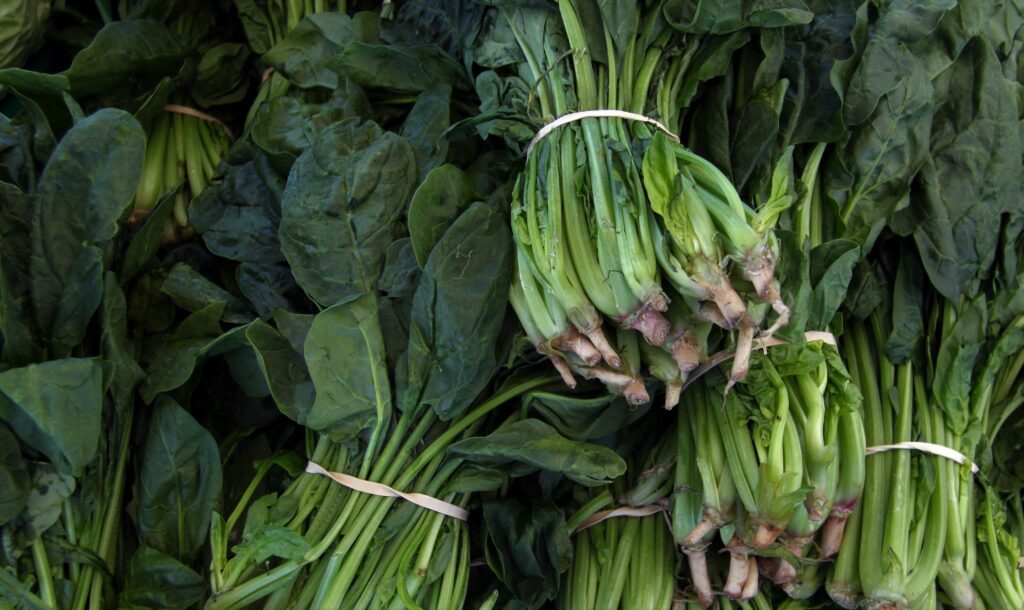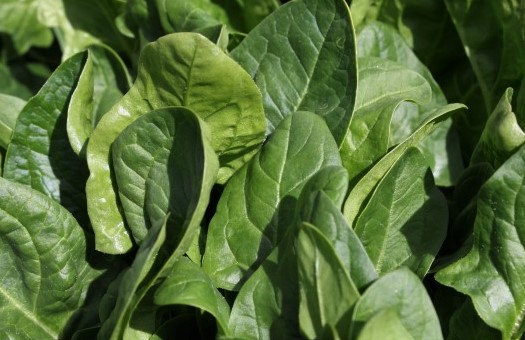Spinach(Palak)
Vegetables are a great food to add to your diet. This leafy green vegetable grows all year round and is full of vitamins and minerals. There are two main types of spinach: plain leaf spinach and savoy spinach. When you buy fresh spinach at the grocery store, it’s usually Savoie spinach. Savoy vegetables are often grilled and rolled. Spinach, also called baby spinach, is very popular in the United States and is sold bagged, canned or frozen.
Physical description
The edible leaves are arranged in a rosette, from which it emerges. Simple leaves are slightly triangular or oval and can be flat or smooth. The flowers are inconspicuous and produce small dry fruits. Vegetables require a cool climate and deep, rich, well-drained soil to provide rapid growth in maximum leaf area.
The seeds can be sown every two weeks from early spring to summer, in rows 30 cm (12 inches) apart, planting the seeds within the row. Sowing the seeds eventually produces a growing plant that produces a harvest in the fall and lasts throughout the winter, providing leaves in early spring or even in all winter if the weather is not too bad.


Nutrition Facts
Spinach (Spinacia oleracea) is one of those amazing green vegetables that is widely recognized as one of the most active foods for its health-promoting antioxidants and cancer-fighting compounds. Its soft, shiny, green leaves are a favorite among chefs around the world. Botanically, it belongs to the Amaranthaceae family and its scientific name is: Spinacia oleracea.
Vegetables contain many plant compounds that can improve health, such as lutein, kaempferol, nitrates, quercetin and zeaxanthin.
Spinacia plants grow to about a foot in height. Although it can be grown year-round, fresh greens are best soon after winter from March to May in the mountains and September to November south of the equator.
Health Advantages of Spinach
Helps lower blood pressure
Among many garden plants, vegetables contain high levels of nitrates. Studies have shown that these nitrates are good for regulating high blood pressure and reducing the risk of developing heart disease. Therefore, eating vegetables is a way to improve heart health while working to lower blood pressure.
Vegetables are also rich in dietary magnesium, which is also important to maintain healthy blood pressure. Finally, the body needs potassium to control the effects of sodium in the body, one of which can be high blood pressure. Vegetables are high in potassium and help maintain healthy blood pressure by ensuring you get enough potassium in your diet.
Improves eye health
The two compounds, zeaxanthin and lutein, have been linked to better eye health. Studies have shown that these antioxidants reduce cataracts and progressive vision loss. Also, the benefits of vegetables also reduce macular degeneration, which is the main cause of blindness. Some studies also show that vegetables can also reverse pre-existing eye damage. In addition to this, vitamin A and vegetable juice can also improve eye health. In fact, vitamin A deficiency can cause night blindness or dry eyes and drinking 240ml of juice provides more than 60% of the daily value that the body needs.
Reduces the risk of cancer cell growth
Many nutrients in spinach come in to prevent or slow down the growth of cancer cells. The plant compound Kaempferol can reduce the risk of cancer and it is found in spinach. In addition, the oxidative stress of free radicals is combated by the antioxidants in vegetables, thus reducing the risk of developing cancer and also aging.
Another study found that the chlorophyll in spinach is effective in protecting the body from the carcinogenic effects of heterocyclic amines. These substances are produced when food is cooked at high temperatures and are known to contribute to the development of cancer. Finally, the compounds MGDG and SQDG in spinach can inhibit cancer growth and studies have also found that MGDG is particularly effective in helping radiation therapy kill pancreatic cancer cells.
Prevention of asthma
Asthma is a chronic disease that can affect people of any age. Many children and adults around the world are affected by it and although treatment can help, trying to prevent the development of asthma should be the most important thing. Fortunately, studies have shown that high consumption of certain foods reduces the risk of developing asthma. Specifically, one study showed that people with high levels of beta-carotene have a lower risk of developing asthma, and a good way to get this nutrient is by eating vegetables. It is a source of beta-carotene which can help protect you from asthma.
Aids in weight loss
If you are planning to lose weight, it is advisable to add spinach to your weight loss diet, it will be beneficial for you. Vegetables help in weight loss and are low in calories. Its high fiber content also helps digestion, controls hypoglycemia and prevents constipation. All you have to do is eat vegetables once a day and it will be good for your health. Vegetables are filling and suppress hunger. So including it in your daily diet will help you in many ways.
Reduces high blood pressure
High blood pressure is also known as high blood pressure which causes many heart diseases, kidney diseases and strokes. So, eating this great food can prevent all these risks and improve your health. Eating at least once a day can reduce stress and anxiety and help calm your mind. Vegetables contain vitamin C which also helps in reducing high blood pressure.
Prevents heart attack and atherosclerosis
Over the years, too much fat is stored in your arteries, which leads to hardening of the arteries, which leads to strokes and atherosclerosis. However, muscles get stronger over the years and to prevent this from happening, you must eat vegetables that will prevent this from happening. This is due to a substance called lutein which prevents your muscles from getting fat. This also prevents the risk of developing heart disease.

